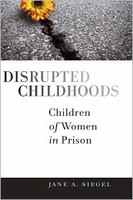
In her new book, a Rutgers–Camden criminologist discusses numerous complex issues facing children of incarcerated parents. Many of these concerns will be addressed during a public conference at Rutgers–Camden Thursday, June 23 that aims to open a dialogue about the needs of children and families of the incarcerated and how the private and public sectors can better respond.
Jane Siegel, an associate professor of criminal justice and chair of the Department of Sociology, Anthropology, and Criminal Justice, has published the book Disrupted Childhoods: Children of Women in Prison (Rutgers University Press, June 2011), which will also be featured during the daylong forum at Rutgers–Camden. Siegel’s book reflects years of research and interviews with children, parents, and guardians before, during, and after incarceration. “My study intended to put incarceration in context with other parts of children’s lives. What was life like when their parents were home and what was life like when they were incarcerated? Oftentimes these families’ lives were disrupted before parents went to prison.”
The public conference, sponsored by the Rutgers–Camden Center for Children and Childhood Studies, the Rutgers–Camden Department of Sociology, Anthropology and Criminal Justice, and the Rutgers School of Law—Camden, hopes to attract practitioners, policy makers, and scholars to explore the ways in which corrections departments can implement family-friendly approaches to their programs and operations and how other systems, like education and child welfare can address children’s and families’ needs.
Panels will be held on policy issues surrounding the Adoption and Safe Families Act (AFSA); the role of educators supporting children and families; the developmental effects of trauma on children; interventions for children of incarcerated parents; and best practices for supporting child and parent relationships. Representatives from regional corrections facilities and social services agencies will also be speaking, in addition to the keynote speaker, a formerly incarcerated father who founded Frontline Dads, for fathers dealing with life before and after incarceration.

Siegel notes that how an inmate maintains relationships, especially with family, while in prison can positively impact their transition back into society. However, it’s often difficult for inmates to maintain these relationships when there are only three options for communicating: visiting, which can be too far for visitors to travel or offers unfriendly visiting hours; by phone, although calls are out-going only and expensive; and letters, which young children can’t often utilize.
“All calls from prison are collect and can be costly for the families caring for the children, who often come from low socioeconomic backgrounds,” adds Siegel, who recalls a grandmother caring for young children of incarcerated parents being forced to decide between taking calls from their father in prison or their mother in prison. “There are just so many difficulties for children trying to keep in contact with their incarcerated parents. Even when they are able to visit, the experience can be difficult because prisons are usually not child-friendly places. Children are searched when they come into the facility, visiting rooms often aren’t welcoming, and the time with the parent is divided with the adult who brought the child there. And leaving their parent behind at the prison can be very painful for the child.”
Siegel suggests in her book that new technologies, like Skype, could facilitate communication between parents and children, which could benefit both the incarcerated parent and the child. “There’s increasing recognition of the importance of reentry and that preparation for reentry should start day one of incarceration, no matter how long the sentence. Staying connected to family strengthens ties that can ease the transition to outside life.”
Being incarcerated could be an opportunity for change for families struggling with drugs, abuse, mental health issues, and crime, but Siegel stresses the great need for support of incarcerated parents. “What benefits the parents has got to be good for the child. No matter what, children want to be with their parents.”
Registration for the conference is available at https://camlaw.rutgers.edu/webapps/payment/register.php?event_id=16. For directions to the Rutgers–Camden campus, visit camden.rutgers.edu.
Media Contact: Cathy K. Donovan
(856) 225-6627
E-mail: catkarm@camden.rutgers.edu